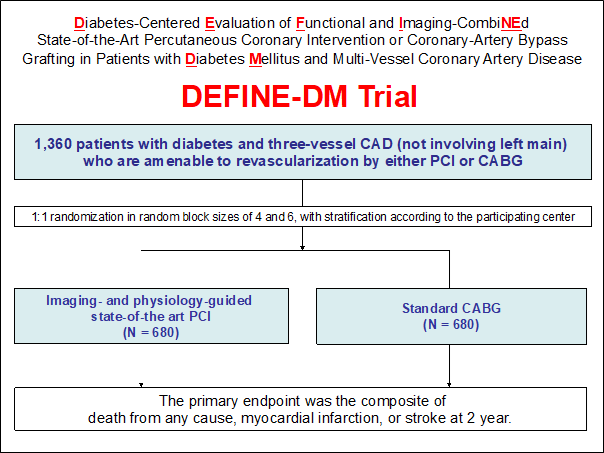
Duk-Woo Park
Asan Medical Center, Korea (Republic of)
At TCTAP 2025, Dr. Duk-Woo Park (Asan Medical Center, Seoul, Korea) will present an important lecture titled Ī░DM and Three-Vessel Disease: Why We Need New RCTs-DEFINE-DM Trial.Ī▒ His presentation will highlight a bold initiative to redefine the revascularization strategy for diabetic patients with multivessel coronary artery disease (CAD) through a rigorously designed trial incorporating contemporary interventional advances.
Why DEFINE-DM Is Needed
For decades, landmark trials such as FREEDOM, BARI 2D, SYNTAX, and BEST have consistently supported coronary artery bypass grafting (CABG) over percutaneous coronary intervention (PCI) in patients with type 2 diabetes mellitus (T2DM) and multivessel CAD. However, most of these studies were limited by outdated technologies-first generation drug-eluting stents (DES), minimal use of physiologic or intravascular imaging guidance, and lack of contemporary guideline-directed medical therapy (GDMT).
Dr. Park will emphasize that the evolution in interventional cardiology now demands a reassessment. With second generation DES, widespread use of IVUS/OCT and FFR/iFR, and robust cardiovascular and antidiabetic therapies—including SGLT2 inhibitors and GLP-1 receptor agonists—the treatment landscape has transformed. DEFINE-DM will aim to answer whether modern PCI can now stand shoulder to shoulder with CABG in diabetic patients with complex coronary disease.
Trial Design and Objectives
The DEFINE-DM (Diabetes-Centered Evaluation of Revascularization Strategy of Functional and Imaging-CombiNEd State-of-the-Art Percutaneous Coronary Intervention or Coronary-Artery Bypass Grafting in Patients with Diabetes Mellitus and Multivessel Coronary Artery Disease) trial will be a multicenter, international, randomized controlled trial, powered to test the non-inferiority of PCI compared with CABG. 1,360 patients with T2DM and angiographically confirmed three-vessel CAD (Ī├50% stenosis in all three major epicardial arteries) will be enrolled, excluding those with left main disease.
Patients will be randomized in a 1:1 fashion to either modern PCI or standard CABG, with revascularization decisions made by an independent heart team. The primary endpoint will be a composite of all-cause death, myocardial infarction (MI), or stroke at 2 years. Secondary endpoints will include each component of the primary composite outcome, a composite of death or MI, a composite of death, MI, stroke or repeat revascularization, stent thrombosis, symptomatic graft occlusion or stenosis, bleeding events, and patient-reported outcomes, including quality of life and angina class.

Interventions in Each Arm
In the PCI arm, lesion selection will be guided by FFR (Ī┬0.80), or adverse imaging features and all procedures will require post-stent optimization using IVUS or OCT. Only second-generation DES will be used. In the CABG arm, surgery will be performed within 30 days of randomization, with internal mammary artery grafting to the LAD and complete revascularization strongly encouraged.
Dr. Park will highlight the strict standardization of procedures across both arms and the protocolĪ»s insistence on contemporary medical therapy. Endocrinology consultations during hospitalization and follow-up will be implemented to ensure optimized diabetic care, including the recommended use of SGLT2 inhibitors or GLP-1 RAs.
Eligibility Criteria
Participants must be Ī├20 years old, have established T2DM, and be deemed suitable for PCI and CABG. Key exclusion criteria will include left main disease, STEMI within 5 days, EF <30%, prior CABG, dialysis, liver cirrhosis, and life expectancy <2 years. At least a 2-year follow-up will be mandated for all patients, with key time points including 1, 6, 12, 18, and 24 months.
Expected Impact and Clinical Significance
Dr. Park will assert that DEFINE-DM represents the first head-to-head randomized trial to directly test whether imaging- and physiology-guided PCI, using modern techniques and therapies, can match the outcomes of CABG in diabetic patients with multivessel CAD. The trial will address key limitations of prior RCTs and reflect real-world contemporary clinical practice.
Integrating intravascular imaging, functional assessment, advanced DES platforms, and optimal GDMT—including the latest antidiabetic agents—DEFINE-DM will offer robust evidence to refine global revascularization strategies.
Ultimately, the results of DEFINE-DM are expected to influence future guidelines, shape clinical decision-making, and help personalize revascularization for complex diabetic patients.
Management of Ischemic Heart Disease 2025: ISCHEMIA Trial Has Been a Major Inescapable Turning Point
Thursday, April 24, 8:10 AM-9:40 AM
Coronary Theater, Level 1
Edited by

Kyusup Lee, MD
The Catholic University of Korea, Daejeon St. Mary's Hospital, Korea (Republic of)

